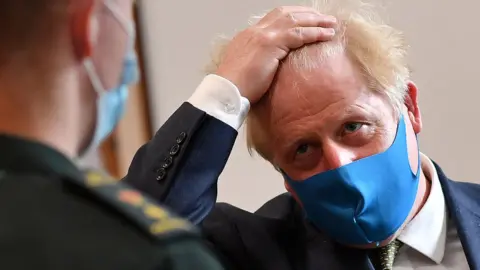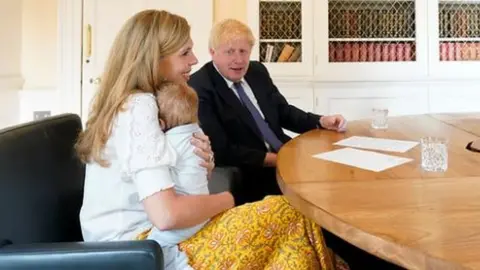Coronavirus: Boris Johnson 'does not want second national lockdown'
 Reuters
ReutersBoris Johnson has said he does not want to impose a second national lockdown in the event of another Covid-19 outbreak.
Speaking to The Sunday Telegraph, the PM compared the option of a nationwide shutdown to a "nuclear deterrent", adding he does not think the country "will be in that position again".
But the UK's chief scientific adviser said there is "a risk" such measures could be needed as winter approaches.
It comes as councils in England have been given "lightning" lockdown powers.
Under the new powers, local authorities can close shops, cancel events and shut outdoor public spaces to manage local outbreaks.
Meanwhile, the UK recorded 27 more coronavirus deaths, bringing the total number of people who have died after a positive test to 45,300. A further 726 Covid-19 cases were confirmed in the last 24 hours.
Scotland saw more than 20 new cases of Covid-19 for the second day running, although First Minister Nicola Sturgeon said it was still a low number of infections and fluctuations were "to be expected".
Mr Johnson said authorities were getting better at identifying and isolating local outbreaks, adding that the power to order national action will remain an option.
"I can't abandon that tool any more than I would abandon a nuclear deterrent. But it is like a nuclear deterrent, I certainly don't want to use it. And nor do I think we will be in that position again," he said.


The PM told The Sunday Telegraph that experts were getting better at spotting the disease, isolating it locally and identifying which groups it affects - and how.
"We're genuinely able now to look at what's happening in much closer to real time, to isolate outbreaks and to address them on the spot, and to work with local authorities to contain the problem locally and regionally if we have to," Mr Johnson said.
It comes after Mr Johnson set out his hopes on Friday for a "significant return to normality" by Christmas.
Under the new guidelines, people can use public transport for journeys immediately, and employers will have more discretion to bring staff back to workplaces if it is safe to do so.
Labour said the government was right to aspire to open up the economy but there were "gaping holes" in its latest plans.
Shadow Foreign Secretary Lisa Nandy said: "You only have to go down the high street to see what the problem is.
"Many people aren't coming out of their houses and they aren't spending because they are nervous about what this means, whether there is going to be a second wave; whether the NHS is going to be overwhelmed, and we really do need to get to grips with the test trace and isolate system - which the government admits is not fully functional." she told Sky News' Sophy Ridge.
She also said the test and tracing system needed to be improved with results back within 24 hours and suggested a "mass winter flu vaccination programme" so people felt "confident there is a plan for a second wave."
Meanwhile, Foreign Secretary Dominic Raab said it is right to give "businesses and the country a target and a sense of hope".
Speaking to the BBC's Andrew Marr, he said from 1 August "while we are carefully monitoring the virus, we do need to get the economy firing on all cylinders, as best we can", adding that there has been "great cooperation with businesses".
On Friday, the UK's chief scientific adviser Sir Patrick Vallance warned that "come winter, the challenges will be very much greater and of course there is a risk that this could also need national measures as well".

At-a-glance: The latest changes in England
- From 25 July indoor gyms, pools and other sports facilities can reopen
- On 1 August the government will update its advice on going to work, asking employers to make decisions about how and where their staff can work safely
- From the same date, most remaining leisure settings, including bowling, skating rinks, casinos and all close contact services, such as beauticians, will be allowed to reopen
- Live indoor theatre and concerts will be able to resume with socially distanced audiences
- Wedding receptions for up to 30 people will also be allowed from next month
- From September, schools, nurseries and colleges will be open for all children and young people on a full-time basis, while universities are also working to reopen as fully as possible
- From October, the government intends to allow audiences to return to stadiums, while conferences and other business events can recommence, subject to the outcome of pilots

And Prof John Edmunds, a member of the government's Scientific Advisory Group for Emergencies (Sage), told the BBC's Today programme that a return to pre-lockdown normality was "a long way off".
He said that activities such as going to work normally, travelling on public transport, going on holiday without restrictions, hugging and shaking hands with friends will not be returning any time soon.
"We won't be able to do that until we are immune to the virus, which means until we have a vaccine that is proven safe and effective.
"If we return to those sort of normal behaviours, the virus will come back very fast," he said.
 Downing Street
Downing Street In the wide-ranging Telegraph interview to mark the prime minister's first year in office, Boris Johnson insisted his agenda for domestic reform and "levelling up" the economy would not be blown off course by the pandemic.
"We want to be a transformative government because there's a massive opportunity in this country to do things differently and to do things better," he said.
"We've seen that really exemplified in what happened with coronavirus."
He said that while the Civil Service was "absolutely fantastic", lessons could be learned from the pandemic.
"Maybe there are ways in which we can all learn together to do things faster, to have a real spirit of 'can do'. I think sometimes it's a question of confidence and belief," he said.

- SOCIAL DISTANCING: What are the rules now?
- YOUR QUESTIONS: Our experts have answers
- LOOK-UP TOOL: How many cases in your area?
- THE R NUMBER: What it means and why it matters

A further 40 coronavirus deaths were announced on Saturday, taking the total number of people who have died after testing positive for coronavirus in the UK to 45,273.
A report released on Tuesday warned the UK could see almost 120,000 new coronavirus deaths in a second wave of infections this winter in a "reasonable" worst-case scenario.
The estimate does not take into account any lockdowns, treatments or vaccines.
Devolved administrations in Scotland, Wales and Northern Ireland have the power to set their own timings for the easing of restrictions.

- STAGED: David Tennant and Michael Sheen offer some light relief
- I MAY DESTROY YOU: The groundbreaking drama making headlines in lockdown

